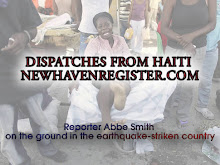Nothing they taught me in journalism school could have prepared me for this trip.
I had an idea about what I was getting into when I volunteered to accompany a medical mission to Haiti organized by St. Mary Roman Catholic Church in Milford.
I had read all the reports coming out of Haiti in the aftermath of the Jan. 12 earthquake that devastated the country’s urban centers.
And I talked to the team members about what they hoped to accomplish through their health clinic and surgery center in the village of Marbial and the city of Jacmel.
And I did my homework before the trip so I could be prepared as possible to file stories and write blog posts with photos from a quake-ravaged country with a crippled infrastructure and rural areas with little electricity and no cell phone service.
Before I could even begin to think about technology, I had to think about biology — my own. I arranged to meet with a travel doctor about a month before the trip and was given a schedule of vaccines to get before departing for Haiti.

I got a total of four vaccinations — typhoid, tetanus, hepatitis A and hepatitis B. Typhoid was by far the most painful, but hepatitis B was fun because it comes in three parts. I got two of my “hep B” shots but I have to get another booster in six months.
Moving onto malaria: There is no vaccine, to the dismay of humanitarian organizations trying to combat the problem in poor countries plagued by the mosquito-spread disease.
Instead, I took Chloroquine pills once a week two weeks before the trip, once during the trip, and I will continue for four more weeks. If I come down with any symptoms of malaria in the next year, I am to head straight to my doctor and report myself as recently returned from a trip to Haiti.
The malaria pills work, but they are not 100 percent effective. As a safety precaution, I brought a mosquito net with me and a spray bottle of DEET that I used to douse myself with three times a day.
The Centers for Disease Control and Prevention also recommends a rabies shot, which I declined. In six months, I am supposed to get a tuberculosis test to make sure I did not contract that disease on my visit.
Arranging my vaccines was the easy part compared to figuring out how I would file stories and update my blog from Haiti. Luckily I got a lot of help from our technology gurus at the Register, some advice from colleagues at other papers I’ve worked at, and pointers from my journalism professors at the University of Colorado in Boulder.
This is how I did it:
I carried everything I needed in a hip pack that never left my side during the trip — notepads and pens, a Flip digital video recorder, digital camera and my global edition BlackBerry, complete with international phone plan. I also had a laptop computer with an international air card.
It was a great setup except I had no cell phone service in Marbial, so it was impossible to file reports from the village. So I would spend one day in Marbial reporting on the medical clinic and taking photos and video and then the next morning I would hitch a ride down the 10-mile-long rocky riverbed to the town of Jacmel, where I could get online and file stories and photos from my laptop.
When the laptop would run out of power (in about 20 minutes) I would continue to take pictures and write stories on my BlackBerry, and then send them directly to the Register. Then it was back to Marbial to start the process anew.
We actually had electricity for five hours a day in Marbial so I could juice up all of my gadgets at night before the lights went out at 11 p.m. sharp. But the real rush of relief came when I would press “send” on my laptop every other morning and know that my reports would get to my editors back in New Haven.
Sometimes that moment came from the back seat of a Land Cruiser as we “off-roaded” over the riverbed. Sometimes it came from the floor outside the hospital in Jacmel where I was observing the surgery team operate on patients.
It’s a different kind of deadline, filing stories from Haiti. I am hoping it makes deadlines back in New Haven a little easier to handle. Then again, here I am late on a Friday afternoon filing my weekend story. I guess some things never change.
Labels: Abbe Smith, Haiti, Marbial, New Haven Register
 I got a total of four vaccinations — typhoid, tetanus, hepatitis A and hepatitis B. Typhoid was by far the most painful, but hepatitis B was fun because it comes in three parts. I got two of my “hep B” shots but I have to get another booster in six months.
I got a total of four vaccinations — typhoid, tetanus, hepatitis A and hepatitis B. Typhoid was by far the most painful, but hepatitis B was fun because it comes in three parts. I got two of my “hep B” shots but I have to get another booster in six months. RSS
RSS









